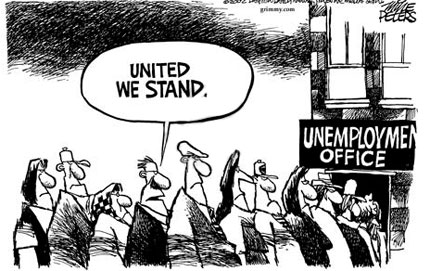Search
Democracy Links
Member's Off-site Blogs
we're saved .....

from the Centre for American Progress …..
Bush's Stimulus Misses The Target
This past weekend, as most Americans celebrated the legacy of Dr. Martin Luther King, Jr., markets all across the world were experiencing precipitous declines.
The fears of a recession "roiled markets from Mumbai to Frankfurt on Monday, puncturing the hopes of many investors that Europe and Asia would be able to sidestep an American downturn." Witnessing the global markets free fall, Federal Reserve Chairman Ben Bernanke took a sudden and surprising action yesterday morning, announcing the single deepest cut in the Fed's main interest-rate target in more than two decades. "The unexpected decision came after a rare, hastily called policy meeting by videoconference on Monday evening, and it reduced the Fed's benchmark overnight lending rate by three-quarters of a percentage point, to 3.5 percent." U.S. News reports that, in private, Bernanke is expressing fear that the United States is falling into a recession that "will be much worse than he has admitted to publicly."
Last Friday, President Bush announced a $145 billion economic stimulus package meant to reassure the "health of the broader economy." The dramatic downturn in global markets over the weekend, however, sent an umistakable message that investors lacked confidence in the President's "grasp of the depth of the problem." Center for American Progress Senior Fellow Christian Weller writes that Bush's proposal "is not targeted enough to get the biggest bang for the buck from the sizeable spending increase he proposed, and it does not include an answer to the threat of sharply lower house prices."
Meeting with House Speaker Nancy Pelosi (D-CA) and Senate Majority Leader Harry Reid (D-NV) yesterday, Bush said that the current economy is "inherently strong" and simply needs a "boost." Ed Lazear, Bush's Chairman of the Council of Economic Advisers, added, "The structure of the American economy is sound." In fact, such happy talk overlooks the fundamental weaknesses of the U.S. economy -- a weak labor market, large budget deficits, massive trade deficits, low productivity growth, and a nationwide decline on house prices. The Philadelphia Fed reported yesterday that the economies shrunk in 23 states -- including Ohio, Missouri, and Arizona -- last month and was stagnant in seven others. For years, the Bush administration has been ignoring these structural deficiencies and masking them with record amounts of debt.
Since the beginning of the current business cycle in early 2001, family incomes in the United States have not risen, yet the costs for important consumer items such as housing, health care, transportation, energy, and food all climbed at often breathtaking speeds. To afford these necessities, families buried themselves in deeper and deeper debt relative to their income -- "at a rate more than four times faster than that in the 1990s." Partly due to the Bush administration's laissez-faire, deregulatory approach to the markets, lenders preyed off low-interest rates and offered risky loans, financing them by borrowing heavily overseas. As a result, a vicious cycle of debt has resulted from the meltdown in the housing market, and the burgeoning crisis has enveloped foreign investors and markets.
Bush's plan to get America out of its economic doldrums is to offer tax rebates and business tax cuts, a package that fully or partially excludes an estimated 65 million taxpayers who would be the most likely to spend the money to help our ailing economy. Business lobbies are already trying to add targeted tax cuts to the stimulus package. But tax rebates alone are not good enough. What is needed instead is some display of economic competence from the Bush administration and conservatives in Congress.
The Center for American Progress Action Fund has crafted a proposed stimulus package with a number of components targeted on spurring demand, including measures such as expanding unemployment insurance, increasing food stamp benefits, and dealing with rising energy costs. But above all, the plan notes, no stimulus plan is complete without solving the housing crisis: "Nothing policymakers could do in 2008 would be more important to the economic prospects of American families and the national economy than actions to stem the decline of home values." As part of this effort, "Congress should create a refinancing vehicle for creditworthy homeowners who cannot refinance because they owe more than the house is worth." House Financial Services Committee Chairman Barney Frank (D-MA) has indicated his desire to "expand availability of federally insured mortgages for subprime borrowers as part of the economic-stimulus plan being negotiated with the White House."
Moreover, beyond a temporary stimulus, a long-term plan is needed.The Center for American Progress has put forward a plan for the next administration to transform America's economy through clearn energy, innovation, and opportunity.
- By John Richardson at 24 Jan 2008 - 8:36pm
- John Richardson's blog
- Login or register to post comments
Recent comments
1 min 53 sec ago
1 hour 43 min ago
1 hour 53 min ago
2 hours 3 min ago
2 hours 57 min ago
3 hours 22 min ago
3 hours 29 min ago
4 hours 33 min ago
5 hours 39 min ago
6 hours 38 min ago